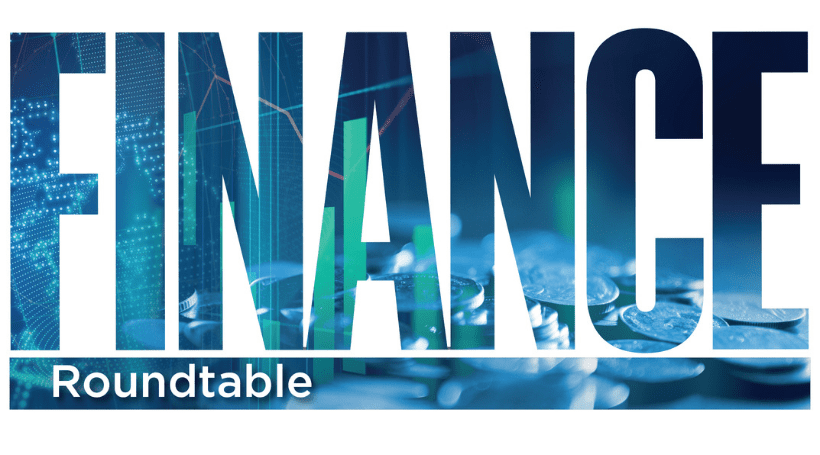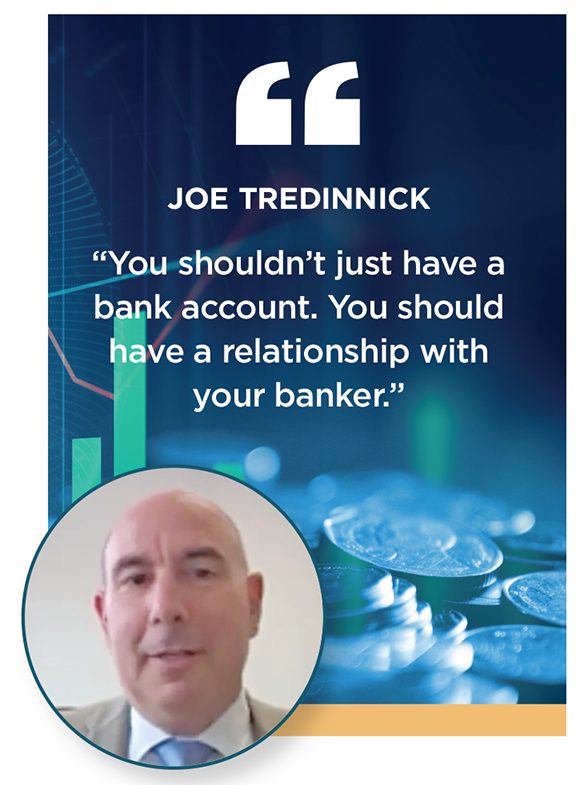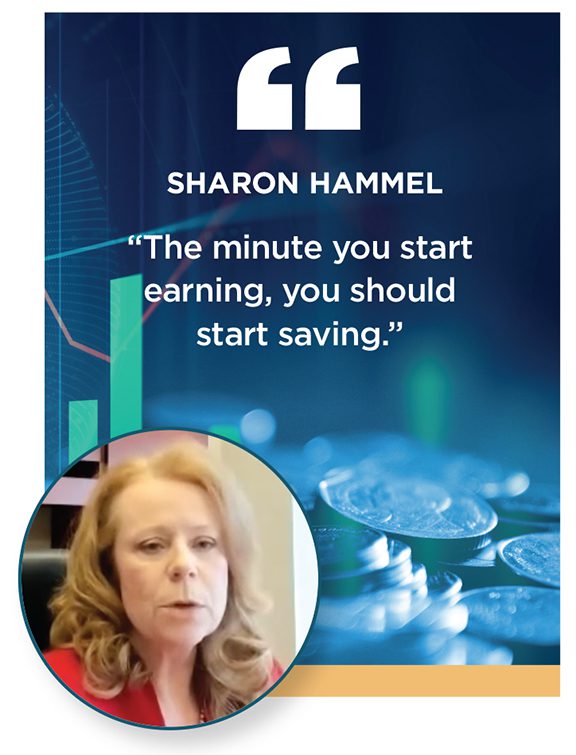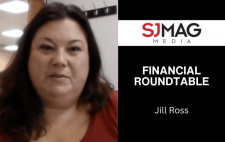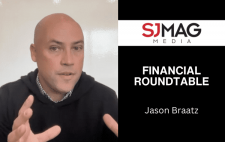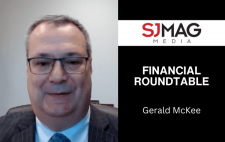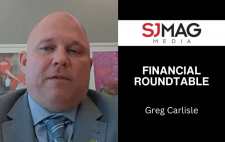Seven experts in banking and wealth management sat down to discuss today’s most pressing financial issues. And there are plenty, with inflation topping the list. It’s a volatile time right now, but all these experts believe the rules of finance hold up. Follow the right advice, they say, and you’ll survive today’s economic challenges.
Participants:
Marianne Aleardi, Moderator, Publisher, SJ Magazine
Catherine Allen-Carlozo, Financial Advisor, HFM Investment Advisors
Mark Finelli, Founder Family, Wealth Partners
Albert Fox, Financial Advisor, Fox Penberthy & Dehn of Morgan Stanley
Ted Massaro, Principal, M Financial Planning Services
Sharon Hammel, SVP/Chief Retail Officer, Republic Bank
Jerry McKee, SVP/Director of Retail Banking, Cornerstone Bank
Joe Tredinnick, EVP/Chief Lending Officer, Cornerstone Bank
Saving during times of inflation
What I like to say is we all have needs, wants and wishes. Get rid of the wishes for now, and just take care of what’s needed and wanted. But don’t cut back on your emergency reserves. A good benchmark is to have 6 months of your cost of living in reserve.
Ted Massaro
I tend to think that inflation is going to be here longer than people think. So you need to make sure you keep plenty of breathing room in your monthly cash flow so you don’t feel squeezed. And remember, these things run in cycles.
Albert Fox
There may be times in your life when you feel you can’t put something aside for savings, but try to keep that habit. You may have to adjust the amount or how often, but keep putting something aside.
Jerry McKee
In January, the national savings rate was 6%. In the past 3 months, it’s down to 5%, which is a pretty dramatic drop. There’s never a reason to not save. As inflation continues to creep up, assess how you are spending money. Where are you spending? Does it make sense to fly on vacation? Maybe you can drive and save a little money. Make informed financial choices about how you’re going to spend your money.
Joe Tredinnick
Right now, my main concern is with retirees on a fixed income. Younger people should have wage growth. If you’re invested in stocks, it may not seem like it today but your assets should grow over time. But for people like my grandmother who are on Social Security, prices are going up too fast for her to be able to control things.
Mark Finelli

If you have a budget, you can see where your costs have gone up, and where you can make modifications. Those changes in your spending will help you manage through inflation. But your savings isn’t something you should change.
Sharon Hammel
There isn’t a one-size-fits-all answer here. Some people will definitely need to pull back on purchases they may not necessarily need. They may want them, but they don’t need them. But never pull back on savings or what you’re putting into your retirement plan.
Catherine Allen-Carlozo
Ready for retirement
Decide what type of lifestyle you want in retirement. Most people want to sustain the standard of living they have. Others want to have a richer retirement. Understand what your expenditures will be, and then figure out your retirement plan. Save for it every day. If you sustain that over your earning years, you should have built enough for your retirement.
Sharon Hammel
Planning for retirement starts way before you retire. I work with someone who said he wanted to retire at 59. He planned for that, and he did it successfully. That plan stretched over a decade. It was deliberate. It was intentional. It took discipline. You have to seek the advice of professionals who can advise you how to get to that end game.
Joe Tredinnick
You want to figure out what your goals are. Do you need a million dollars to retire? Do you need $2 million? 3? The answer is individual, because one person doesn’t spend money the same way another person does. So have a conversation with a financial planner. We crunch the numbers and help you see what the future can look like.
Catherine Allen-Carlozo
People don’t grasp that they’re probably going to live 25 to 40 years in retirement. Couples could spend anywhere from $200,000 – $300,000 for healthcare – that’s the national average. Think about: What if my health changes? What are the risks of relocating? How am I going to protect myself or my spouse? Think about the unexpected, stay realistic and have a plan.
Ted Massaro
When you’re getting closer to retirement, you may have to change the balance in your portfolio and pull back from riskier investments because you have less time to make up for any loss. Be cognizant of that.
Jerry McKee
Start getting organized. Build a net worth statement and start consolidating older accounts to see where you are. Put it all on a spreadsheet, and then develop a plan.
Mark Finelli
The first thing to do is identify a group of professionals who you might consider talking to, so you can iron out a game plan. Lay all your cards on the table, everything about you financially, professionally, emotionally, your family dynamics, and then work on your goals. Start with good advice and tie it all together so you have a good probability of having a great outcome.
Albert Fox
For women
Women have unique challenges that men don’t necessarily have. Women live longer, which is good news and bad news. There is a statistic that 80% of men die married, and 80% of women die single. Women over age 85 have a higher risk of not having enough money. And two thirds of women, at some point in their lives, become caregivers and aren’t paid, which means they aren’t putting money into social security benefits or retirement plans. There’s a lot of advice I give women to make sure they understand the financial risks they may be faced with.
Catherine Allen-Carlozo
About 50% of women still are not an integral part of the financial decision-making in their households, so they don’t always have an understanding of the household income and expenditures. That knowledge is probably one of the most important things for women to have. On average, women outlive men. So they need to ask themselves what the impact of that could look like. Have they planned for it? Do they have credit in their name? Women should be proactive and take ownership of the financial impacts they may experience.
Sharon Hammel
Advice for parents with kids about to start college
It’s important you share with your children the true cost of college: This is what the cost is and this is what I can afford, which means you’re going to have to pay this much. Include them in the conversation and talk openly and honestly while they’re in high school. It’s never too early to talk about the cost of education.
Joe Tredinnick
For clients with young children, we use a 529 plan, so they get a tax-free opportunity to put a pool of capital away. We also tend to have conversations with people about how much skin in the game they want their child to have. There are a lot of ways for children to participate in their education.
Albert Fox
If you haven’t been able to save cash, there are plenty of resources out there. With my children, I took some of the costs on myself and they took out loans for it as well. The advantage for them, with all the recent discussion, is their student loan debt may be forgiven. That’s an advantage they have versus the parent who takes out a loan, because nobody is worried about forgiving us.
Jerry McKee

You need to start saving for college for children early, but with the rising cost of college education what you save may not support it all. Parents need to assess their own financial well-being and look at whether they can afford to do a parent loan and take on that payment. Then they can make that personal decision.
Sharon Hammel
When people say they can afford to pay for their child’s college education, we have to make sure they really can afford it. I know people who have made sure their children don’t have any college debt, but then they have nothing put away for retirement. You don’t want to have to move in with your kids because you can’t afford to live on your own.
Catherine Allen-Carlozo
There are better avenues to pay for college than the current student loan system. If you have financial resources or a home equity account – and your goal is to help your kids – I would look at some of those options before I go the student loan route.
Mark Finelli
There are no such things as retirement loans. So if you’re using your retirement savings to cover your child’s future college costs, you’re taking money that’s going to affect your standard of living when you retire. You’re putting money into your child who’s 17 or 18 and has 70-80 years to live, and you have 20 or 30 years to live.
Ted Massaro
Financial mistakes
The biggest mistake is putting off saving in your employer 401k or in your emergency fund. You can procrastinate against anything else in life, but procrastinating with your savings may be the worst decision you make.
Mark Finelli
The first mistake is not having any kind of a financial plan. Second mistake is not doing your homework. Financial consumers have the ability to do due diligence more than ever before. And one last mistake is not having a relationship with a banker, someone who is an expert in the field and gives you objective perspectives.
Joe Tredinnick
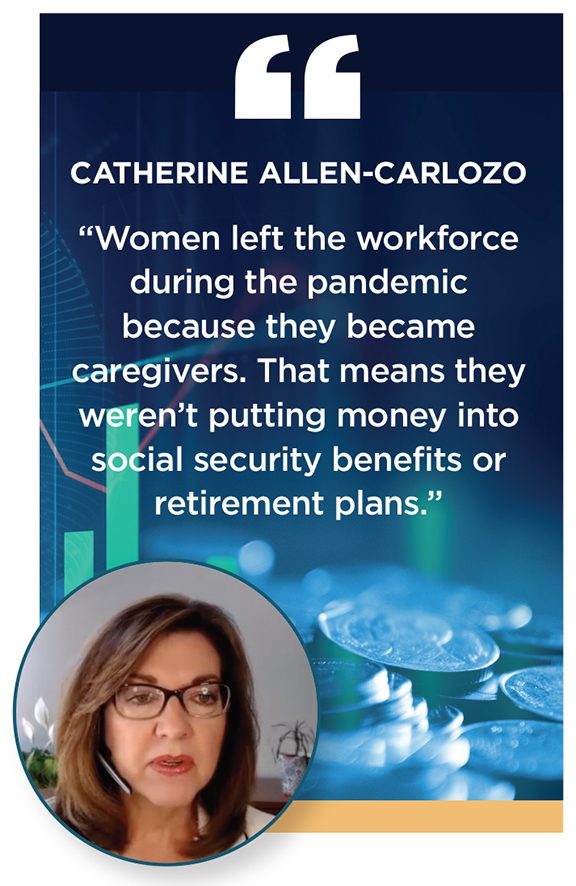
The biggest mistake people make is they let their emotions dictate their decision-making. Fear is a lot stronger than long-term resolve. You need to have a disciplined plan, revisit it frequently, and stay focused.
Albert Fox
Mistakes people make are not having a budget, not monitoring their spending and not saving first – that’s one of the biggest principles that people don’t put enough focus on. Take 20% of your income and put it towards savings. Pay yourself first. That basic principle is really, really important.
Sharon Hammel
A big financial mistake is when people take their Social Security money early, before what we call the full retirement age. When you do that, it is a permanent loss to what you’re going to get for the rest of your life.
Catherine Allen-Carlozo
It’s a mistake to not prioritize savings – even if you just take a little bit and put it aside.
Jerry McKee
We’ve all heard the saying: Plan your work and work your plan. That goes with financial planning. When you’re developing a financial plan, you need that same philosophy. Develop a plan, and then follow through every year. This is not a one-and-done situation. Consistency is important.
Ted Massaro
On budgets
In the past, your cable bill would be part of your budget, you paid “X” for cable. But now everybody’s paying $5 for this streaming service, $10 for this streaming service. People don’t sit back and realize they’re paying for something they haven’t used in 6 months. Looking at those monthly costs is part of the budgeting process.
Jerry McKee
A budget is a plan that helps you prepare for unknowns in your life.
Sharon Hammel
A budget might be harder to stick to than a diet, especially in retirement. But if you can build a budget and use the framework your financial advisor provides, then stick to it as best you can, it will help you long-term.
Mark Finelli
People are shocked when you tell them to look at their ATM transactions and see where they really spend their money. They discover a $4 cup of coffee adds up over the course of a month, pretty significantly, and there’s a lot of lost money in their account. Know what your expenses are.
Joe Tredinnick
Everyone should have a spending plan, which is a different word than a budget. It should start with paying yourself first, off the top, before you do anything else. Then live off the bottom. That’s a reward-based system for people.
Albert Fox
A budget is important. And young people seem to be very comfortable with the budgeting process because of technology. My son joined the firm 5 years ago, and he works with a lot of young professionals. They seem to really grasp the importance of budgeting. They’ve seen the consequences for their parents who didn’t have budgets.
Ted Massaro
Advice for young professionals with disposable cash
Save aggressively. Think about what you want to do in the next 2-5 years and develop a long-term investment plan that will match your short-term goals.
Al Fox
Save, save, save, it’s critical. If you have multiple credit cards, get rid of them. Get down to 1 or 2 and only use them for emergencies. And be honest with yourself when you go to buy something: Is it something you really need?
Ted Massaro
This is the best time to be able to put money aside. Once you get married and start having a family, you’ll have extra expenses. Starting early to save will get you off to a great start. This is the time to max out your savings with the understanding that you can scale it all back once you settle down.
Jerry McKee
First, get rid of any credit card debt. Start putting money into a retirement plan – starting early will make a significant difference in your future. You don’t want to strap yourself, but you do want to start putting money away.
Catherine Allen-Carlozo
It’s difficult as a young person to think of being 30, let alone 40 or 50 or even in retirement, but max out your 401k and take advantage of a company match. When I started making money, I wanted to spend the money. Fortunately, I had some mentors who pushed me to start thinking about savings and retirement. I started slow, and built up over time.
Joe Tredinnick
This is a tough way to think, but when you’re young, it’s the easiest time to save – even though you are making the least amount of money in your career. Think ahead, the 30-year-old you might own a house, you might have a couple of kids, it’s not going to get easier to save.
Mark Finelli
The role of a wealth advisor
You need a wealth advisor when you get your career established and you have serious finances that you want to think about long-term. There are multiple ways to resource that now. There’s the CFP website and multiple professional associations. Most of our clients come to us via referral from an estate attorney or a CPA, or from a satisfied client.
Ted Massaro
A wealth advisor shouldn’t be someone who’s just managing your money. They should be looking at your whole picture. We’re really like a fiscal philosopher. I work with clients to plan for their dreams. That’s really what my job is – financial planning is just a method to get there.
Catherine Allen-Carlozo
A good financial advisor will stand up to you during difficult times and help you do what’s in your best interest, even if it doesn’t feel comfortable to do it. A good financial advisor will really be a surrogate therapist at certain times in your life to help you think through the myriad of financial decisions that affect you or your family.
Albert Fox
Think of a good wealth advisor as a coach. At times you need to be coached through a tough period like we have right now. Other times you need to be coached into making the right financial decision. Find a financial professional and use their knowledge. Don’t read 40 articles. Don’t ask a bunch of people at the watercooler for their financial advice. Ask your financial advisor.
Mark Finelli
Relationships with your bank
For us, it’s about solving people’s problems and helping them achieve their goals financially. As a community bank, we have the ability and expertise to provide that concierge-type service and dialogue to help people problem solve.
Joe Tredinnick
It’s an individual experience. We have an engagement opportunity as a financial institution to understand what’s important to a customer, what they’re trying to accomplish and then apply the right solution. That’s one of the reasons why we still support that 7-day bank model. We want to fully engage with an individual to be a meaningful financial partner.
Sharon Hammel


